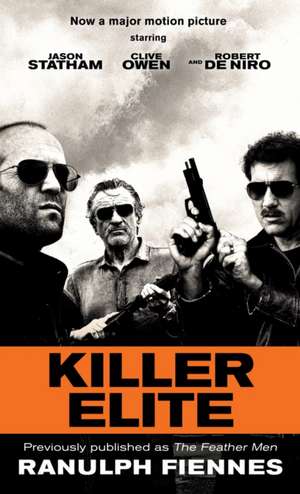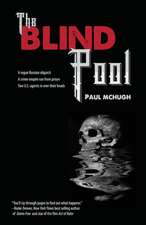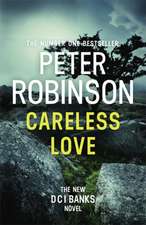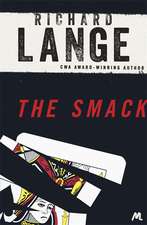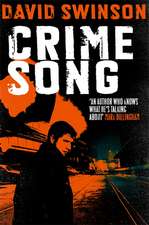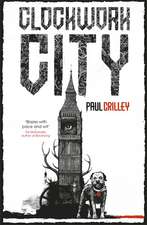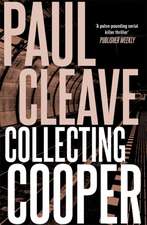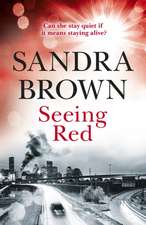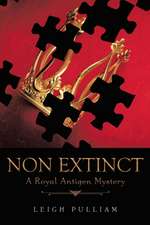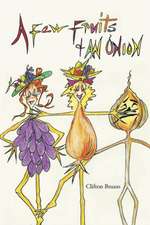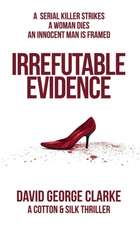Killer Elite: Random House Movie Tie-In Books
Autor Ranulph Fiennesen Limba Engleză Paperback – 31 aug 2011
Here is a gripping novel, inspired by real-life events, about a private team of British vigilantes that sets out to eliminate a gang of cold-blooded contract killers. From 1977 to 1990, four former British soldiers die, one by one, supposedly due to accident or illness. But soon a link is established between the victims: a shared mission in the desert kingdom of Oman, where they fought for a sultan against insurgents and ruined the life of a rival sheikh, who in turn has sent a band of assassins to methodically slay the soldiers and salvage his pride. Now these clever assassins are on the run from an underground group of SAS vets with nothing to lose, no time to waste, and a desire to dispense their own form of justice—no matter the cost.
Previously published as The Feather Men
Preț: 46.36 lei
Nou
Puncte Express: 70
Preț estimativ în valută:
8.87€ • 9.29$ • 7.34£
8.87€ • 9.29$ • 7.34£
Carte indisponibilă temporar
Doresc să fiu notificat când acest titlu va fi disponibil:
Se trimite...
Preluare comenzi: 021 569.72.76
Specificații
ISBN-13: 9780345528087
ISBN-10: 0345528085
Pagini: 390
Dimensiuni: 108 x 175 x 32 mm
Greutate: 0.19 kg
Editura: BALLANTINE BOOKS
Seria Random House Movie Tie-In Books
ISBN-10: 0345528085
Pagini: 390
Dimensiuni: 108 x 175 x 32 mm
Greutate: 0.19 kg
Editura: BALLANTINE BOOKS
Seria Random House Movie Tie-In Books
Notă biografică
Ranulph Fiennes has traveled to the most dangerous and inaccessible places on earth. In the process he lost nearly half his fingers to frostbite, nearly died on several occasions, and raised millions for charity. He discovered the lost city of Ubar in Oman, was the first man to reach both poles by surface travel, and was also the first to cross the Antarctic continent unsupported. In 1993, Queen Elizabeth II awarded him the Order of the British Empire for “human endeavor and charitable services.” An elite soldier, athlete, mountaineer, and renowned explorer, Fiennes is also the author of nineteen books of both fiction and nonfiction.
Extras
1
Daniel had never left home before. Vancouver in the clean, crisp summer of 1945 was full of wonder to this prospector's son from a remote village on the Arctic coast of Alaska. The reason for this happy visit was the end of the war in Europe and the return of his father by troopship that day.
Amid whirling bunting and the cheering of proud relatives, the veterans clambered off the Canadian Pacific steam train, some to renew their previous lives and loves, many to face the bitter realization of unattainable dreams or unexpected betrayals.
Daniel did not notice that his father was thin and gaunt, for he was still a great bear of a man and he bore gift-wrapped parcels of exciting shapes.
A taxicab took the family to their cheap lodgings close to Lion's Gate bridge. After tea and once the first waves of excitement were spent, Father made his long-planned pronouncement.
"We have six days before the steamer takes us home, my hidjies." Nobody knew why he called them that-only that it had a good, warm meaning. "And we will never forget these days, because the Hun are smashed forever and we are together."
The deep, flaky bilberry pie did the rounds again and everyone slept well despite their excitement, all six to the single bedroom.
The days flickered by in a kaleidoscope of happiness. They watched folk skiing on the lower slopes of Mount Grouse, on long planks of wood that looked impossible to control. Many skiers came to grief and Dan and his family laughed till the tears came.
They took a horse and cab to the wharves, bought toffee apples and walked hand in hand to watch the tradesmen at the sugar factory, and the trawlers with their brawny crews. Thousands more soldiers and sailors returned on giant troopships and the family joined the welcoming crowds. They saw the zoo and a pantomime, gazed at the sleaze of Gas Town and sang with gusto on the Sunday, for Mother and Father were keen Presbyterians, he with his Dutch Reform Church upbringing and she with a background of Wyoming and pioneer stock.
The Sunday before they were to take the steamer north, Father sprang his big surprise . . . There was a traveling circus in town and, dammit, they would check it out that very night.
Before the great event they squeezed into a packed church and joined in the songs of praise and the prayers of thanksgiving of the Vancouver people for the deliverance of their loved ones.
Then to the circus.
Clowns, elephants that could count, a giraffe, bears in kilts, dwarves, a sasquatch monster from the forests of the Rocky Mountain Trench, black fuzzy men, balloon shoots for prizes, and coconuts from the South Pacific propped on posts.
Even at five, brought up among Eskimo children, Daniel could throw the wooden ball straight and true. And he could shoot a light gun with fair accuracy providing he could take his time. He glowed with pride at his armful of coconuts and wooden teddies.
They cried with delight inside the sparkling waterways of the Canal of Love; they oohed and aahed with delicious horror in the House of Screams as ghouls of sacking and animal bones swished by on unseen pulleys.
Everyone but seven-year-old Naomi, who hated heights, was awed when Father pointed to the monstrous Roller-Wheel with its eighteen swinging gondolas. Daniel sat on his narrow seat, filled with curiosity and sticky-lipped with candy floss. An Indian and a grinning Chinaman, both in top hats, checked that the family were all strapped in. Because he was so little he was jammed in beside eleven-year-old Ruth, his eldest sister. In front of him sat Naomi, his mother's hands clenched about her and, at the prow of the gaily painted craft, just behind the carved redskin figurehead with its fearsome features, sat their father, beaming with pride and forever glancing over his shoulder to check that his brood were "having the finest time of their lives," especially his dear wife, to whom he had sworn that very morning, as he held her close, that he would never, never leave her again . . . not for the Commonwealth nor yet for the King himself.
As other families took their seats, the great twinkling wheel rotated in fits and starts until all the gondolas were filled with laughing, or gaping, passengers.
Then a whistle blew, the Chinaman waved a flag and two gates of steel clanged shut below them. Daniel smelled hot oil and roasted chestnuts. The cool air lifted Naomi's golden hair. Dad shouted, "Hold on, my love. Hold tight, my little darlings . . . try to kiss the stars."
The wheel spun ever faster and Daniel loved the speed, the height, the newness of it all. Only when Naomi screamed did the intense wonder that he felt begin to fade. And as his other sisters started to moan, even big Ruth, he knew that he too should be sensing fear. But he felt only more aware, more able to observe and consider. The giddy, lurching passage of the gondola was not as before. Something had changed. They were out of kilter with the mother wheel. He saw sparks in growing streams and a broken spar. Their cockleshell had come away from its housing on one side and as they swung over the top of the great arc and began the downward rush, so the remaining hinge-spar split and they were free, cartwheeling through space.
Nobody heard their screaming as they fell, for the carousels and the brass bands, the loudspeakers and sideshow criers produced a cacophony of sound that would have drowned out the knell of doom. And nobody saw the lace bonnet of young Anna, who clung by herself to the rearmost seat, glide and dip away like a falling kite.
The gondola crashed through the canvas of a small marquee. Ruth's body and the whim of chance saved Daniel's life. He was thrown against a pile of clothing. The wind was knocked out of him and his legs were broken but he remained fully conscious.
He saw the wrecked and green-painted prow, the head of a warrior, deeply impaled in the bowels of a fat Gypsy lady. He saw that his mother and Naomi had landed, tightly embracing, on the Gypsy's table. Their heads had come together with such force that the gray hair and the golden hair seemed to sprout from a single pulp. They were mercifully still but for their stockinged legs, which jerked in time with the billowing canvas of the ruined tent. Of sister Anna he could see no trace: perhaps an angel had caught her in the air and she was saved, as he was. He could feel no pain, only a desperate need to gulp for more air.
He thought he heard his name whispered aloud. Father was staring down at him, attached by one arm to the shattered upper end of the main tent pole. But now he was foreshortened, like the circus dwarves, for his torso had been severed at the waist. Daniel could see this all so clearly, for his father's remains were close above him and the mouth, agape beneath the thick moustache, did indeed seem to pout with the shape of Daniel's name.
From that moment until the present day, whenever de Villiers felt the images of that night hover at the fringes of his mind, he clenched his fists and forced them away.
With the passage of years, the warmer human emotions, with which he had been genetically blessed, remained in place on the far side of his self-imposed shutter. By excluding his sensitivities, de Villiers had retained his sanity. He was, but for his chosen profession as a contract killer, a pleasant enough human being . . .
2
Dhofar is the southern province of Oman, sharing desert borders with Saudi Arabia and South Yemen. In the 1960s a band of Dhofari nationalists, aiming to rid their country of an oppressive Omani sultan, visited the USSR in search of support. Their nationalist and Muslim aspirations were soon redirected by the Soviets into a new guerrilla unit called the Popular Front for the Liberation of Oman (PFLO). The unit's Marxist fighters, operating on their own home ground, were frighteningly efficient and for a while invincible. Fortunately, in 1970, Qaboos bin Said exiled his reactionary father, became the new sultan and proclaimed an amnesty. Many terrorists responded and were formed into armed firqat groups to fight against their former comrades, often from the same tribe or family.
Amr bin Issa, Sheikh of the Bait Jarboat tribe in Dhofar, was not a happy man. At forty-seven he was envied by many of his fellow jebalis, mountain tribesmen, for he was rich-richer than most jebalis could imagine.
As a seventeen-year-old Amr had left home with an uncle and sailed the Gulf waters in sardine dhows. For a while he worked as a gardener in Bahrain and as a delivery courier around town using a Lambretta moped. He had a keen eye for business and took advantage of the newfound wealth of the United Arab Emirates to set up a grocery and hardware shop in Dubai. A retail chain of Woolworth's lookalikes then evolved, second only to Khimji Ramdas in size and profitability.
Amr had married young, for he had a strong sexual appetite. His first wife was a great disappointment to him. She was an orphan girl who, like the majority of Dhofari women, had been brutally circumcised soon after birth. Her clitoris had been removed and, with it, most of her sensuality. Two sons were born who remained with their mother when Amr divorced her and went abroad. She remarried a man from the Bait Antaash and Amr rarely saw the two boys. Nonetheless they remained the blood of his blood.
His second marriage was altogether different. At the age of twenty- four he stopped off at an island on a fishing voyage and fell in love with a fourteen-year-old Shahra girl, Shamsa. Even before he discovered that her sexuality was intact he had determined to marry her, for to him she seemed the most alluring creature on earth.
The Shahra ranked low in the strict tribal hierarchy of Dhofar. Once the most powerful tribe in the land, they had borne the brunt of a century's fighting against Portuguese invaders. Greatly weakened, the Shahra gradually became subjugated to the Qara tribes until they were "nontribe," losing the right to carry weapons and working only as serfs to the Qara in return for security. Shahra men could not take wives from the master tribes although the women, lighter-skinned than most Dhofaris, were available to all as brides at especially low prices.
Out of a powerful sexual bond grew a friendship and trust that was rare in Dhofari marriages. Shamsa bore Amr four sons over the next seven years. Amr was a proud husband and father, a successful businessman and popular within the Bait Jarboat tribe when, in 1970, their sheikh died without a hereditary successor. The dead leader had spent much of his life avenging the tribe's honor following a series of raids which had decimated and impoverished them in the 1940s. There was great contention among the Bait Jarboat about who should succeed him. Those of the tribe associated with the hard-core communists of the PFLO had their champion, while the nonatheistic majority favored Amr, whose great wealth, personal wisdom and family connections were held in high esteem. Amr won and became sheikh.
Like most of his countrymen, from sheikh to humble wood collector, Amr and his sons fought with the PFLO for the freedom of Dhofar. One of his sons was killed in 1969, a second in 1972 and yet another in January 1975, all at the hands of the government forces. In accordance with the tribal tradition of thaa'r, or revenge, it was Amr's duty to avenge himself for the killing of his sons.
For three years, with the war at its height, the newly appointed Sheikh Amr did his best for the tribe, leaving his business concerns to his managers in the Gulf. In Dubai he was an extremely wealthy man, but on the jebel he lived much the same sort of life as other jebalis.
In 1974 Shamsa had conceived unexpectedly and, following a fall while she was driving their goats over the hill pastures, had died in childbirth. Amr was stunned. His tribal duties lost their importance to him. His popularity slowly waned and the machinations of his opponents stirred accordingly. A cousin named Hamoud, envious of Amr's position, used Amr's failure to fulfill the thaa'r and avenge the deaths of his three sons as fuel to rouse tribal sentiments against him.
Fundamentalist Islamic law embraces various rules, or sharia, but by far the most binding for a Dhofari are those of thaa'r. The aggrieved relative is expected by law to insist on an eye for an eye. In return for murder, execution. For manslaughter, blood money. No time limit is set on the deed of vengeance. It can take place forty years on, but the executor must show his intention clearly and act as circumstances allow.
There are many different applications of the thaa'r even within a single Islamic country, because the dictates of the Koran simply reflect, in a modified form, the principles of pre-Islamic tribal behavior. If among the elders of a tribe there is dissension as to how the hadiyth, the Prophet's sayings, should be applied, then a consensus of opinion, ijma', can produce any solution. Over the years the differences in the severity with which Koranic punishments are applied in different lands have increased greatly. Sunni, Shi'ite and, in Oman, Ibadi Muslims apply further differences as a result of their own considerable divergences within the body of Islam.
Sudan is a Muslim country but the thaa'r there has become all but nonexistent. In 1988 five Palestinian terrorists murdered two Sudanese and five British peace workers in a Khartoum hotel. They were arrested and the Sudanese government contacted the parents of the dead Britons through the Foreign Office. A middle-aged suburban couple in Britain were suddenly faced with the choice of whether they wished their child's murderers to be executed, fined or pardoned. They were unable to make up their minds, and all five terrorists were released from jail in January 1991. In Dhofar Sultan Qaboos has had enormous success in subduing the thaa'r, to the extent that there were more tit-for-tat killings in Northern Ireland in 1990 than there were thaa'r murders in Dhofar. But the hard-core believers merely bide their time.
In July 1990 a jebali civil servant, a long-since pardoned member of the PFLO, was commuting to his air-conditioned office in Salalah in his air-conditioned Mercedes. He stopped at a zebra crossing to allow a pedestrian to pass. Over the past twelve years the two men had often passed each other in the street. That morning something snapped in the mind of the civil servant and he rammed the pedestrian against a wall, seriously injuring him. He was sent to jail, having readily admitted his intention to kill the man, who had murdered his brother back in 1973.
Daniel had never left home before. Vancouver in the clean, crisp summer of 1945 was full of wonder to this prospector's son from a remote village on the Arctic coast of Alaska. The reason for this happy visit was the end of the war in Europe and the return of his father by troopship that day.
Amid whirling bunting and the cheering of proud relatives, the veterans clambered off the Canadian Pacific steam train, some to renew their previous lives and loves, many to face the bitter realization of unattainable dreams or unexpected betrayals.
Daniel did not notice that his father was thin and gaunt, for he was still a great bear of a man and he bore gift-wrapped parcels of exciting shapes.
A taxicab took the family to their cheap lodgings close to Lion's Gate bridge. After tea and once the first waves of excitement were spent, Father made his long-planned pronouncement.
"We have six days before the steamer takes us home, my hidjies." Nobody knew why he called them that-only that it had a good, warm meaning. "And we will never forget these days, because the Hun are smashed forever and we are together."
The deep, flaky bilberry pie did the rounds again and everyone slept well despite their excitement, all six to the single bedroom.
The days flickered by in a kaleidoscope of happiness. They watched folk skiing on the lower slopes of Mount Grouse, on long planks of wood that looked impossible to control. Many skiers came to grief and Dan and his family laughed till the tears came.
They took a horse and cab to the wharves, bought toffee apples and walked hand in hand to watch the tradesmen at the sugar factory, and the trawlers with their brawny crews. Thousands more soldiers and sailors returned on giant troopships and the family joined the welcoming crowds. They saw the zoo and a pantomime, gazed at the sleaze of Gas Town and sang with gusto on the Sunday, for Mother and Father were keen Presbyterians, he with his Dutch Reform Church upbringing and she with a background of Wyoming and pioneer stock.
The Sunday before they were to take the steamer north, Father sprang his big surprise . . . There was a traveling circus in town and, dammit, they would check it out that very night.
Before the great event they squeezed into a packed church and joined in the songs of praise and the prayers of thanksgiving of the Vancouver people for the deliverance of their loved ones.
Then to the circus.
Clowns, elephants that could count, a giraffe, bears in kilts, dwarves, a sasquatch monster from the forests of the Rocky Mountain Trench, black fuzzy men, balloon shoots for prizes, and coconuts from the South Pacific propped on posts.
Even at five, brought up among Eskimo children, Daniel could throw the wooden ball straight and true. And he could shoot a light gun with fair accuracy providing he could take his time. He glowed with pride at his armful of coconuts and wooden teddies.
They cried with delight inside the sparkling waterways of the Canal of Love; they oohed and aahed with delicious horror in the House of Screams as ghouls of sacking and animal bones swished by on unseen pulleys.
Everyone but seven-year-old Naomi, who hated heights, was awed when Father pointed to the monstrous Roller-Wheel with its eighteen swinging gondolas. Daniel sat on his narrow seat, filled with curiosity and sticky-lipped with candy floss. An Indian and a grinning Chinaman, both in top hats, checked that the family were all strapped in. Because he was so little he was jammed in beside eleven-year-old Ruth, his eldest sister. In front of him sat Naomi, his mother's hands clenched about her and, at the prow of the gaily painted craft, just behind the carved redskin figurehead with its fearsome features, sat their father, beaming with pride and forever glancing over his shoulder to check that his brood were "having the finest time of their lives," especially his dear wife, to whom he had sworn that very morning, as he held her close, that he would never, never leave her again . . . not for the Commonwealth nor yet for the King himself.
As other families took their seats, the great twinkling wheel rotated in fits and starts until all the gondolas were filled with laughing, or gaping, passengers.
Then a whistle blew, the Chinaman waved a flag and two gates of steel clanged shut below them. Daniel smelled hot oil and roasted chestnuts. The cool air lifted Naomi's golden hair. Dad shouted, "Hold on, my love. Hold tight, my little darlings . . . try to kiss the stars."
The wheel spun ever faster and Daniel loved the speed, the height, the newness of it all. Only when Naomi screamed did the intense wonder that he felt begin to fade. And as his other sisters started to moan, even big Ruth, he knew that he too should be sensing fear. But he felt only more aware, more able to observe and consider. The giddy, lurching passage of the gondola was not as before. Something had changed. They were out of kilter with the mother wheel. He saw sparks in growing streams and a broken spar. Their cockleshell had come away from its housing on one side and as they swung over the top of the great arc and began the downward rush, so the remaining hinge-spar split and they were free, cartwheeling through space.
Nobody heard their screaming as they fell, for the carousels and the brass bands, the loudspeakers and sideshow criers produced a cacophony of sound that would have drowned out the knell of doom. And nobody saw the lace bonnet of young Anna, who clung by herself to the rearmost seat, glide and dip away like a falling kite.
The gondola crashed through the canvas of a small marquee. Ruth's body and the whim of chance saved Daniel's life. He was thrown against a pile of clothing. The wind was knocked out of him and his legs were broken but he remained fully conscious.
He saw the wrecked and green-painted prow, the head of a warrior, deeply impaled in the bowels of a fat Gypsy lady. He saw that his mother and Naomi had landed, tightly embracing, on the Gypsy's table. Their heads had come together with such force that the gray hair and the golden hair seemed to sprout from a single pulp. They were mercifully still but for their stockinged legs, which jerked in time with the billowing canvas of the ruined tent. Of sister Anna he could see no trace: perhaps an angel had caught her in the air and she was saved, as he was. He could feel no pain, only a desperate need to gulp for more air.
He thought he heard his name whispered aloud. Father was staring down at him, attached by one arm to the shattered upper end of the main tent pole. But now he was foreshortened, like the circus dwarves, for his torso had been severed at the waist. Daniel could see this all so clearly, for his father's remains were close above him and the mouth, agape beneath the thick moustache, did indeed seem to pout with the shape of Daniel's name.
From that moment until the present day, whenever de Villiers felt the images of that night hover at the fringes of his mind, he clenched his fists and forced them away.
With the passage of years, the warmer human emotions, with which he had been genetically blessed, remained in place on the far side of his self-imposed shutter. By excluding his sensitivities, de Villiers had retained his sanity. He was, but for his chosen profession as a contract killer, a pleasant enough human being . . .
2
Dhofar is the southern province of Oman, sharing desert borders with Saudi Arabia and South Yemen. In the 1960s a band of Dhofari nationalists, aiming to rid their country of an oppressive Omani sultan, visited the USSR in search of support. Their nationalist and Muslim aspirations were soon redirected by the Soviets into a new guerrilla unit called the Popular Front for the Liberation of Oman (PFLO). The unit's Marxist fighters, operating on their own home ground, were frighteningly efficient and for a while invincible. Fortunately, in 1970, Qaboos bin Said exiled his reactionary father, became the new sultan and proclaimed an amnesty. Many terrorists responded and were formed into armed firqat groups to fight against their former comrades, often from the same tribe or family.
Amr bin Issa, Sheikh of the Bait Jarboat tribe in Dhofar, was not a happy man. At forty-seven he was envied by many of his fellow jebalis, mountain tribesmen, for he was rich-richer than most jebalis could imagine.
As a seventeen-year-old Amr had left home with an uncle and sailed the Gulf waters in sardine dhows. For a while he worked as a gardener in Bahrain and as a delivery courier around town using a Lambretta moped. He had a keen eye for business and took advantage of the newfound wealth of the United Arab Emirates to set up a grocery and hardware shop in Dubai. A retail chain of Woolworth's lookalikes then evolved, second only to Khimji Ramdas in size and profitability.
Amr had married young, for he had a strong sexual appetite. His first wife was a great disappointment to him. She was an orphan girl who, like the majority of Dhofari women, had been brutally circumcised soon after birth. Her clitoris had been removed and, with it, most of her sensuality. Two sons were born who remained with their mother when Amr divorced her and went abroad. She remarried a man from the Bait Antaash and Amr rarely saw the two boys. Nonetheless they remained the blood of his blood.
His second marriage was altogether different. At the age of twenty- four he stopped off at an island on a fishing voyage and fell in love with a fourteen-year-old Shahra girl, Shamsa. Even before he discovered that her sexuality was intact he had determined to marry her, for to him she seemed the most alluring creature on earth.
The Shahra ranked low in the strict tribal hierarchy of Dhofar. Once the most powerful tribe in the land, they had borne the brunt of a century's fighting against Portuguese invaders. Greatly weakened, the Shahra gradually became subjugated to the Qara tribes until they were "nontribe," losing the right to carry weapons and working only as serfs to the Qara in return for security. Shahra men could not take wives from the master tribes although the women, lighter-skinned than most Dhofaris, were available to all as brides at especially low prices.
Out of a powerful sexual bond grew a friendship and trust that was rare in Dhofari marriages. Shamsa bore Amr four sons over the next seven years. Amr was a proud husband and father, a successful businessman and popular within the Bait Jarboat tribe when, in 1970, their sheikh died without a hereditary successor. The dead leader had spent much of his life avenging the tribe's honor following a series of raids which had decimated and impoverished them in the 1940s. There was great contention among the Bait Jarboat about who should succeed him. Those of the tribe associated with the hard-core communists of the PFLO had their champion, while the nonatheistic majority favored Amr, whose great wealth, personal wisdom and family connections were held in high esteem. Amr won and became sheikh.
Like most of his countrymen, from sheikh to humble wood collector, Amr and his sons fought with the PFLO for the freedom of Dhofar. One of his sons was killed in 1969, a second in 1972 and yet another in January 1975, all at the hands of the government forces. In accordance with the tribal tradition of thaa'r, or revenge, it was Amr's duty to avenge himself for the killing of his sons.
For three years, with the war at its height, the newly appointed Sheikh Amr did his best for the tribe, leaving his business concerns to his managers in the Gulf. In Dubai he was an extremely wealthy man, but on the jebel he lived much the same sort of life as other jebalis.
In 1974 Shamsa had conceived unexpectedly and, following a fall while she was driving their goats over the hill pastures, had died in childbirth. Amr was stunned. His tribal duties lost their importance to him. His popularity slowly waned and the machinations of his opponents stirred accordingly. A cousin named Hamoud, envious of Amr's position, used Amr's failure to fulfill the thaa'r and avenge the deaths of his three sons as fuel to rouse tribal sentiments against him.
Fundamentalist Islamic law embraces various rules, or sharia, but by far the most binding for a Dhofari are those of thaa'r. The aggrieved relative is expected by law to insist on an eye for an eye. In return for murder, execution. For manslaughter, blood money. No time limit is set on the deed of vengeance. It can take place forty years on, but the executor must show his intention clearly and act as circumstances allow.
There are many different applications of the thaa'r even within a single Islamic country, because the dictates of the Koran simply reflect, in a modified form, the principles of pre-Islamic tribal behavior. If among the elders of a tribe there is dissension as to how the hadiyth, the Prophet's sayings, should be applied, then a consensus of opinion, ijma', can produce any solution. Over the years the differences in the severity with which Koranic punishments are applied in different lands have increased greatly. Sunni, Shi'ite and, in Oman, Ibadi Muslims apply further differences as a result of their own considerable divergences within the body of Islam.
Sudan is a Muslim country but the thaa'r there has become all but nonexistent. In 1988 five Palestinian terrorists murdered two Sudanese and five British peace workers in a Khartoum hotel. They were arrested and the Sudanese government contacted the parents of the dead Britons through the Foreign Office. A middle-aged suburban couple in Britain were suddenly faced with the choice of whether they wished their child's murderers to be executed, fined or pardoned. They were unable to make up their minds, and all five terrorists were released from jail in January 1991. In Dhofar Sultan Qaboos has had enormous success in subduing the thaa'r, to the extent that there were more tit-for-tat killings in Northern Ireland in 1990 than there were thaa'r murders in Dhofar. But the hard-core believers merely bide their time.
In July 1990 a jebali civil servant, a long-since pardoned member of the PFLO, was commuting to his air-conditioned office in Salalah in his air-conditioned Mercedes. He stopped at a zebra crossing to allow a pedestrian to pass. Over the past twelve years the two men had often passed each other in the street. That morning something snapped in the mind of the civil servant and he rammed the pedestrian against a wall, seriously injuring him. He was sent to jail, having readily admitted his intention to kill the man, who had murdered his brother back in 1973.
Recenzii
“Marvelously entertaining.”—Kirkus Reviews
“Highly suspenseful.”—Publishers Weekly
“Highly suspenseful.”—Publishers Weekly
Descriere
Descriere de la o altă ediție sau format:
Sir Ranulph Fiennes' bestselling novel which was filmed as Killer Elite starring Robert De Niro in 2011.
Sir Ranulph Fiennes' bestselling novel which was filmed as Killer Elite starring Robert De Niro in 2011.
